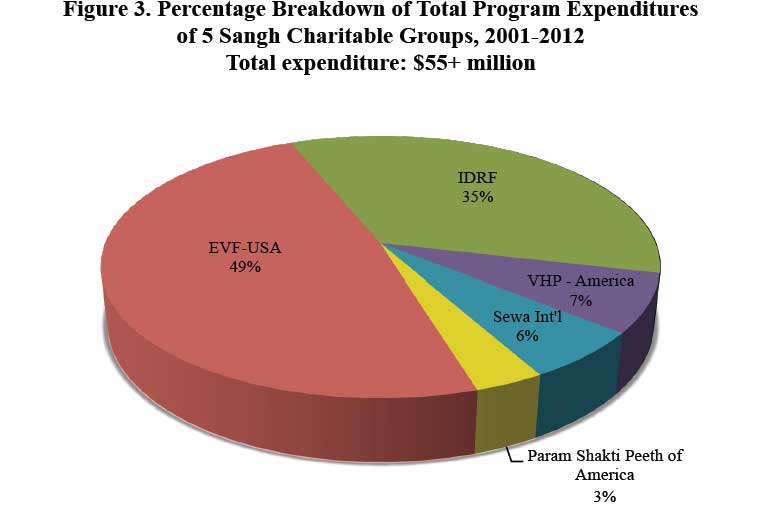
THIS report compiles publicly available tax records, newspaper articles, and other materials on non-profit groups in the United States affiliated with the Sangh Parivar (family of Hindu nationalist groups) from 2001-2014, documenting a segment of the projects and priorities of U.S.-based Hindu nationalism. This report discusses the strategies and activities of Hindu nationalist groups in the United States in four areas of mobilization. EXECUTIVE SUMMARY 1. Over the last three decades, a movement toward Hinduizing India—advancing the status of Hindus toward political and social primacy in India— has continued to gain ground in South Asia and diasporic communities. The Sangh Parivar (the Sangh “family”), the network of groups at the forefront of this Hindu nationalist movement, has an estimated membership numbering in the millions, making the Sangh one of the largest voluntary associations in India. The major organizations in the Sangh include the Rashtriya Swayamsevak Sangh (RSS), Vishwa Hindu Parishad (VHP), Bajrang Dal, and Bharatiya Janata Party (BJP). 2. Hindu nationalism has intensified and multiplied forms of discrimination, exclusion, and gendered and sexualized violence against Muslims, Christians, other minorities, and those who oppose Sangh violations, as documented by Indian citizens and international tribunals, fact-finding groups, international human rights organizations, and U.S. governmental bodies. 3. India-based Sangh affiliates receive social and financial support from its U.S.-based wings, the latter of which exist largely as tax-exempt non-profit organizations in the United States: Hindu Swayamsevak Sangh (HSS), Vishwa Hindu Parishad of America (VHPA), Sewa International USA, Ekal Vidyalaya Foundation-USA. The Overseas Friends of the Bharatiya Janata Party - USA (OFBJP) is active as well, though it is not a tax-exempt group. YOUTH & FAMILY PROGRAMS 4. Sangh-affiliated youth and family programs, such as those held by the Hindu Swayamsevak Sangh and the Vishwa Hindu Parishad of America, have concentrated their classes, camps, events, and materials on Hindu cultural identity. As of May 2014, there were 140 HSS shakhas (chapters) in the United States listed on the HSS website. Between 2002 and 2012 the HSS and VHP have collectively spent more than $2.5 million on youth and family programs. Literature used by such programs often prioritize a version of history and culture that highlights the Sangh Parivar leadership of India and Brahminical (upper-caste) narratives and practices, while diminishing the struggles and contributions of lower caste and non-Hindu communities. 5. In 2009, Sangh-affiliated Hindu Students Council (HSC) student groups were present on 78 U.S. and Canadian university and college campuses, including those of Duke University, Emory University, Johns Hopkins University, Massachusetts Institute of Technology, McGill University, New York University, University of Wisconsin at Madison, Stanford University, Syracuse University, University of California at Berkeley, Irvine, and San Diego, University of Ottawa, and University of Texas at Austin and Houston. CHARITABLE ORGANISATIONS 6. From 2001 and 2012, five Sangh-affiliated charitable groups (India Development and Relief Fund, Ekal Vidyalaya Foundation of America, Param Shakti Peeth, Sewa International, and Vishwa Hindu Parishad of America) allocated over $55 million dollars to their program services, funds which are largely sent to groups in India. Several of the recipient groups have affiliations with the India-based Sangh Parivar, and more investigation is needed into: a) other funding channels from the United States; Hindu Nationalism in the United States: A Report on Nonprofit Groups b) whether the monies collected were allocated to the purposes reported to the Internal Revenue Service; and c) the effects of funding recipients’ work. ACADEMIC & ASSOCIATED SITES 7. Hindu nationalist groups have increasingly inserted themselves into curricular, administrative, and financing arenas in academic and educational institutions, specifically in the disciplines of history, religious studies, Indology and other fields. Particular projects include the establishment and operation of a religious college, the Hindu University of America, at least one religious studies conference (World Association for Vedic Studies), and funding institutions, such as the Infinity Foundation and the Vivek Welfare and Educational Foundation. From 2001 to 2013, the Infinity Foundation gave more than $1.9 million to researchers, academic associations, and academic departments around the world, including the Association for Asian Studies, California Institute of Integral Studies, the Center for the Study of Developing Societies, Columbia University, Harvard University, Melbourne University, National Institute of Advanced Studies, Rutgers University, University of Hawaii, and the University of Texas at Austin. SANGH LEADERSHIP IN INDO-AMERICAN COMMUNITIES 8. Over the last two decades, Sangh-affiliated organizations have emerged as leaders in Indo-American communities. Major events include: a) Overseas Friends of the BJP (OFBJP) co-hosted a luncheon on Capitol Hill in early March 2002 with two other major Indian-American organizations, while BJP-ruled Gujarat witnessed mass killings of Muslims. b) OFBJP members and the Asian American Hotel Owners Association (AAHOA) were among the leadership that sought to host Gujarat Chief Minister Narendra Modi as an honored guest speaker in 2005. c) In the California textbook controversy of 2005-2006, the Vedic Foundation and Hindu Swayamsevak Sangh’s educational wing, the Hindu Education Foundation, led an effort to insert edits into California textbooks that foregrounded Hindu nationalist priorities and downplayed gender and caste oppression in Ancient India. d) Since the textbooks controversy, the Hindu American Foundation has become a voice for Hindu nationalist interests to U.S. politicians. FURTHER STEPS 9. Further investigations are needed to explore: a) possible legal culpability of U.S.-based Sangh groups and members in Sangh-led violent acts in South Asia; b) possible violations of 501(c)(3) regulations and restrictions; and c) the involvement of other U.S.-based groups and individuals in supporting violence perpetrated by Hindu nationalist groups. Courtesy: Countercurrents July 1, 2014


